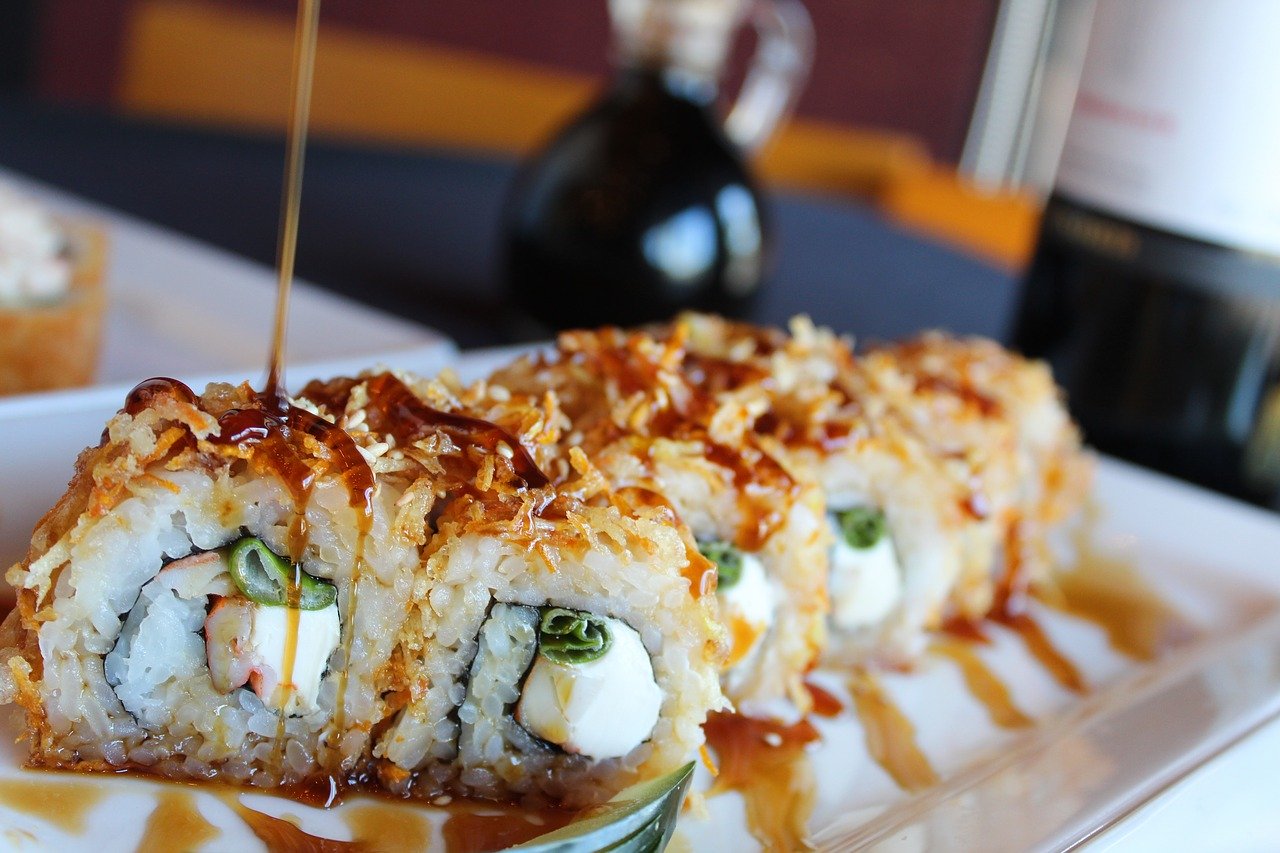If you’re learning Japanese, 食べ物 tabemono food is one of the things you’ll probably need to – or at least want to – talk about. So in this post, let’s dig in to some vocabulary for food, cooking, and meals.
おなかがすきました! Onaka ga sukimashita! I’m hungry!
Let’s start with things you might want to say before you have something to eat or drink.
- おなかがすきました。
Onaka ga sukimashita.
I’m hungry. - おなかがペコペコです。
Onaka ga pekopeko desu.
I’m starving! - 喉が渇きました。
Nodo ga kawakimashita.
I’m thirsty.
- 喉がカラカラです。
Nodo ga karakara desu.
I’m dying of thirst! - 何か食べたいです。
Nani ka tabetai desu.
I want something to eat. - 何か飲みたいです。
Nani ka nomitai desu.
I want something to drink. - おやつが食べたいです。
Oyatsu ga tabetai desu.
I feel like a snack.
夕飯ができました! Yuuhan ga dekimashita! Dinner is ready!
The meals in Japanese are 朝ご飯 asagohan (breakfast), 昼ご飯 hirugohan (lunch), and 夕飯 yuuhan (dinner). A snack is おやつ oyatsu.
- 今日の朝ご飯は何ですか。
Kyou no asagohan wa nan desu ka.
What’s for breakfast? - 今日の昼ご飯は何ですか。
Kyou no hirugohan wa nan desu ka.
What’s for lunch? - 今日の夕飯は何ですか。
Kyou no yuuhan wa nan desu ka.
What’s for dinner? - デザートは何ですか。
Dezaato wa nan desu ka.
What’s for dessert? - 私は朝早く朝ご飯を食べます。
Watashi wa asa hayaku asagohan o tabemasu.
I eat breakfast early. - 同僚と昼ご飯を食べます。
Douryou to hirugohan o tabemasu.
I eat lunch with colleagues. - 家族と夕飯を食べます。
Kazoku to yuuhan o tabemasu.
I eat dinner with my family.
レストランで Resutoran de At a restaurant
If you go to a restaurant, these expressions may come in handy.
- {一名/二名/三名/四名/五名}です。
{Ichimei/Nimei/Sanmei/Yonmei/Gomei} desu.
A table for one/two/three/four/five, please. - 予約はございますか。
Yoyaku wa gozaimasu ka.
Do you have a reservation? - 予約してあります。
Yoyaku shite arimasu.
I/We have a reservation. - 予約していません。
Yoyaku shite imasen.
I/We don’t have a reservation. - メニューはありますか。
Menyuu wa arimasu ka.
Do you have a menu? - 英語のメニューはありますか。
Eigo no menyuu wa arimasu ka.
Do you have a menu in English? - ワインリストはありますか。
Wain risuto wa arimasu ka.
Do you have a wine list? - ご注文はお決まりですか。
Gochuumon wa okimari desu ka.
Are you ready to order? - 注文をお願いします。
Chuumon o onegaishimasu.
I’m/We’re ready to order. - まだ決まっていません。
Mada kimatte imasen.
I’m/We’re not ready to order. - もう少し時間をください。
Mou sukoshi jikan o kudasai.
A few more minutes, please. - お勧めは何ですか。
Osusume wa nan desu ka.
What do you recommend? - {ナプキン/フォーク/ナイフ/スプーン/お箸}をいただけますか。
{Napukin/Fooku/Naifu/Supuun/Ohashi} o itadakemasu ka.
Could I have a napkin/fork/knife/spoon/chopsticks? - お水を一杯いただけますか。
Omizu o ippai itadakemasu ka.
Could I have a glass of water? - お勘定をお願いします。
Okanjou o onegaishimasu.
Check, please. - どちらでお支払いすればいいですか。
Dochira de oshiharaisureba ii desu ka.
Where do I pay?
私はベジタリアンです。 Watashi wa bejitarian desu. I’m vegetarian.
If you’re on any kind of restricted diet, you may need to know these helpful expressions before you order.
- ダイエット中です。
Daiettochuu desu.
I’m on a diet. - 私はベジタリアンです。肉も魚も食べません。
Watashi wa bejitarian desu. Niku mo sakana mo tabemasen.
I’m vegetarian. I don’t eat meat or fish. - 私はビーガンです。動物由来のものは食べません。
Watashi wa biigan desu. Doubutsu yurai no mono wa tabemasen.
I’m vegan. I don’t eat any animal products. - グルテンは食べません。
Guruten wa tabemasen.
I don’t eat gluten. - ピーナッツアレルギーです。
Piinattsu arerugii desu.
I’m allergic to peanuts. - 乳製品アレルギーです。
Nyuuseihin arerugii desu.
I’m allergic to dairy products. - ナッツアレルギーです。
Nattsu arerugii desu.
I’m allergic to tree nuts. - 貝のアレルギーです。
Kai no arerugiidesu.
I’m allergic to shellfish. - お酒は飲みません。
Osake wa nomimasen.
I don’t drink alcohol. - カフェイン入りの飲み物は飲みません。
Kafein iri no nomimono wa nomimasen.
I don’t drink caffeine. - これはコーシャー認証されていますか。
Kore wa kooshaa ninshou sarete imasu ka.
Is this food kosher? - これはハラル認証されていますか。
Kore wa hararu ninshou sarete imasu ka.
Is this food halal?
あまり辛くしないでください! Amari karaku shinaide kudasai! Not too spicy, please!
People can tolerate different levels of heat in their food, so you may want to say:
- これは辛いですか。
Kore wa karai desu ka.
Is this spicy? - 辛い食べ物が好きです。
Karai tabemono ga suki desu.
I like spicy food. - 辛い食べ物が好きではありません。
Karai tabemono ga suki dewa arimasen.
I don’t like spicy food. - 激辛にしてください。
Gekikara ni shite kudasai.
Very spicy, please. - 中辛でお願いします。
Chuukara de onegaishimasu.
Medium spicy, please. - 辛くしないでください。
Karaku shinaide kudasai.
Not spicy, please. - 辛すぎます。
Karasugimasu.
It’s too spicy. - あまり辛くありません。
Amari karaku arimasen.
It’s not too spicy.
お味はいかがですか。 Oaji wa ikaga desu ka. How’s your food?
The four basic tastes are 塩辛い shiokarai (salty), 甘い amai (sweet), 苦い nigai (bitter), 酸っぱい suppai (sour). But if someone asks how your food is, you’ll probably want know a bit more than that.
- 美味しいです。
Oishii desu.
It’s delicious. - 熱すぎます。
Atsusugimasu
It’s too hot. - 冷たすぎます。
Tsumetasugimasu.
It’s too cold. - 甘すぎます。
Amasugimasu.
It’s too sweet. - しょっぱいです。
Shoppai desu.
It’s too salty. - 味がしません。
Aji ga shimasen.
It’s tasteless/bland. - 焼き過ぎです。
Yakisugi desu.
It’s overcooked. - 生焼けです。
Namayake desu.
It’s undercooked. - あぶらっこいです。
Aburakkoi desu.
It’s oily/greasy.
料理をするのが好きです。 Ryouri o suruno ga suki desu. I like to cook.
Sometimes, it’s nice to stay in and cook, especially if お料理が上手ですね ryouri ga jouzu desu ne. (you’re a good cook.) Here are some basic vocabulary and expressions for cooking.
- 夕飯を作ります。
Yuuhan o tsukurimasu.
I’m going to cook dinner. - 作り方は{簡単/難しい}です。
Tsukurikara wa {kantan/muzukashii} desu.
This is an easy/hard recipe. - 材料を買いに行かなければなりません。
Zairyou o kaini ikanakereba narimasen.
I need to buy the ingredients. - お湯を沸かしています。
Oyu o wakashite imasu.
I’m boiling water. - ご飯を炊いています。
Gohan o taite imasu.
I’m cooking rice. - {パスタ/じゃがいも}を茹でています。
{Pasuta/Jagaimo} o yudete imasu.
I’m cooking pasta/potatoes. - 野菜を炒めています。
Yasai o itamete imasu.
I’m frying vegetables. - {鶏肉/魚}を焼いています。
{Toriniku/Sakana} o yaite imasu.
I’m frying chicken/fish. - {パン/クッキー/ケーキ}を焼いています。
{Pan/Kukkii/Keeki} o yaite imasu.
I’m baking bread/cookies/a cake. - {ラム肉/鶏肉/牛肉}を焼いています。
{Ramuniku/Toriniku/Gyuuniku} o yaite imasu.
I’m roasting lamb/chicken/beef. - {魚/鶏肉/野菜}を焼いています。
{Sakana/Toriniku/Yasai} o yaite imasu.
I’m grilling fish/chicken/vegetables. - 材料を混ぜています。
Zairyou o mazete imasu.
I’m mixing the ingredients. - ソースを混ぜています。
Soosu o mazete imasu.
I’m stirring the sauce. - {塩/砂糖/水/ハーブ/スパイス}を加えています。
{Shio/Satou/Mizu/Haabu/Supaisu} o kuwaete imasu.
I’m adding salt/sugar/water/herbs/spices.
ごゆっくりどうぞ! Goyukkuri douzo! Enjoy your meal!
Learn Japanese with the Language Garage
Check out our other posts on Japanese language, culture, and more. And if you’re looking for convenient and affordable live Japanese lessons with a real teacher, check out the Language Garage. Our lessons are given online in a virtual classroom, so it doesn’t matter where you live or work – we can come to you. And we have flexible options, with a free trial so that you can decide if there’s a fit. Check us out!
Image by Josue Cordero from Pixabay.





